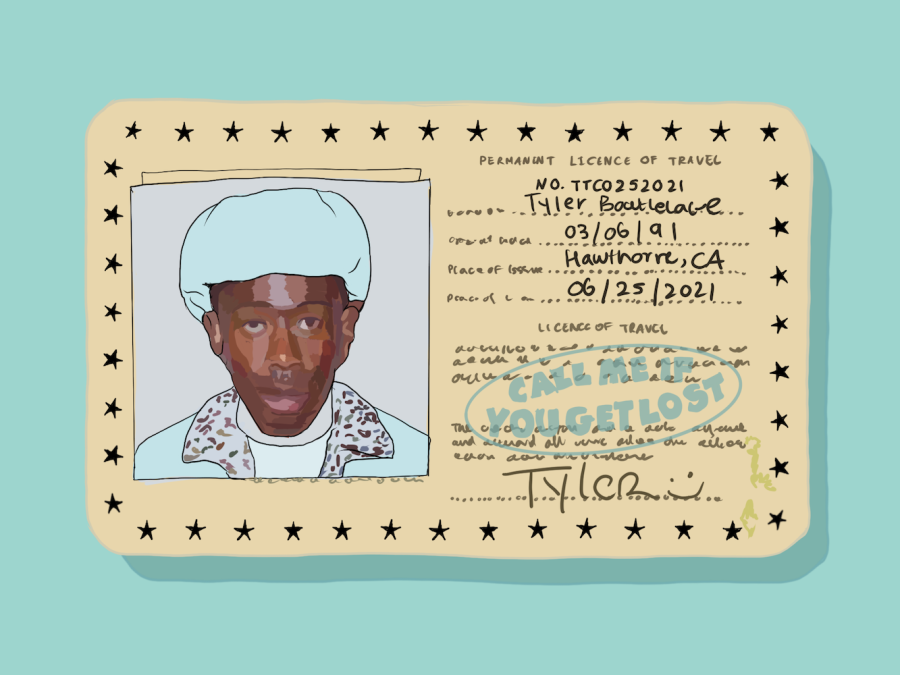Tyler, The Creator puts his alter ego to rest with ‘The Estate Sale’
The deluxe edition of “Call Me If You Get Lost” marks the end of an era for Tyler Baudelaire.
(Illustration by Aaliya Luthra)
April 19, 2023
“Thank you to every ear that listened, bought a ticket,” Tyler, the Creator says at the start of his song “Everything Must Go.” After months of touring and winning Best Rap Album at the Grammys for “Call Me If You Get Lost” last year, Tyler is ready to move on from the alter ego Tyler Baudelaire. He is closing everything off with “The Estate Sale,” a deluxe edition of the album that features eight new tracks.
As his sound shifted away from the down-and-dirty feel of his early 2010’s Odd Future collaborations to a more pop-friendly direction in 2017’s “Flower Boy” and 2019’s “Igor,” Tyler began to embrace a new aesthetic. His days of shirtless hooliganism on the sketch comedy series “Loiter Squad” were over, and so was the version of Tyler that ate cockroaches as seen in his breakout music video for “Yonkers.”
The new Tyler, which manifested with the release of 2021’s “Call Me If You Get Lost,” looked like he’d stepped out of a Wes Anderson or an Alain Resnais frame, oozing sophistication with his pastel cardigans and horn-rimmed glasses. Gone were the days of vitriolic rapping; instead, Tyler’s new persona, “Tyler Baudelaire,” paid homage to the Parisian poet Charles Baudelaire, whose romantic verses were as far removed from Tyler’s origins in the Los Angeles street scene as you could get.
This new Tyler began to emphasize materialism in his lyrics, whether related to cars, private jets or jewelry. These lyrics have caused some of his fans to criticize him, as they yearn for the old Tyler whose more mundane concerns made him more relatable. In “What A Day,” Tyler raps, “White boy said I brag too much, the Black kid said it’s inspiring.” Despite the criticism, Tyler continued to feature the luxuries of fame in his productions, including in songs like “Stuntman.”
The new addendum to “Call Me If You Get Lost” features Vince Staples, who delivers with his characteristic gruff vocals and I-don’t-give-a-shit attitude. The chemistry between both rappers comes through on the energetic track, their confidence rapping together beaming in the chorus, when they come together and proclaim, “I’ll show you how to stunt.” With a heavy bass beneath, “Stuntman” proves that Tyler, The Creator and Vince Staples are the perfect musical pair that we should’ve heard from sooner.
DJ Drama returns for the deluxe album with adlibs throughout the tracks, a role he takes on after hosting the entirety of the “Call Me If You Get Lost.” “By now, we’ve shown you the way,” DJ Drama says, closing out “Stuntman.”
In “What a Day,” Tyler admits he can be conceited. He has a stressful lifestyle, he says, but he continues to work regardless: “I am a workaholic and I need to get me some rest / I’d rather get these ideas off, I’d rather not steer off my path.” He touches on his rise to fame and how he has branded himself differently from most rappers. Over a somber instrumental, “What A Day” provides a breather that allows listeners to reflect on the character Tyler is constructing through his musical storytelling. Although he might be conceited, maybe he deserves to be. As he himself says, “Put yourself first if you’re livin’ with a dream.”
After being ignored for five months, Tyler was finally able to get his longtime friend A$AP Rocky on the track titled “Wharf Talk.” However, Rocky’s verse is short enough to go almost unnoticed. With ’80s synths featured alongside stylistic, off-key vocals, the production style seems to fit Tyler’s older album, “Flower Boy.”
Tyler closes out “The Estate Sale” with the song “Sorry Not Sorry.” The vulnerable track examines his problematic past and how he has grown from his mistakes. “Sorry to the fans who say I changed / ‘cause I did,” he sings.
He even touches on his relationship with his mother and his sexuality. He calls out those who “claim [he] don’t know about minimum wage or Section 8,” calling back to 2011’s “Smuckers” when he rapped, “Mom, I made you a promise, it’s no more section 8.” Tyler apologizes to both “the guys” he had to hide and “the girls” he had to lie to, blowing back against his speculative fans who constantly try to decipher his sexual orientation. “I don’t wanna talk / Sorry if you gotta dig for info I don’t wanna give,” he asserts. The background vocals create intensity, with spontaneous screams adding to the drama. The vulnerability felt throughout the final track could cement it as a career best for Tyler.
“The Estate Sale” is the perfect ending to the meticulous career detour of “Call Me When You Get Lost,” in which Tyler traded his characteristic grittiness for a more vulnerable and poetic voice. Lyrically, Tyler came back stronger while implementing past production styles. While reflecting on the past, he is also looking into the future with many visions of children and settling down. Tyler is ready to start anew, leaving no baggage behind. “The Estate Sale” brings out the Tyler hiding behind the alter ego Tyler Baudelaire, pronouncing the end of an era.
“Sometimes you just want to restart,” Tyler said at the beginning of the music video for “Dogtooth.” “Everything must go, whether it takes all day or all night.”
Contact Tatyanna Gooden at [email protected].



























































































































































